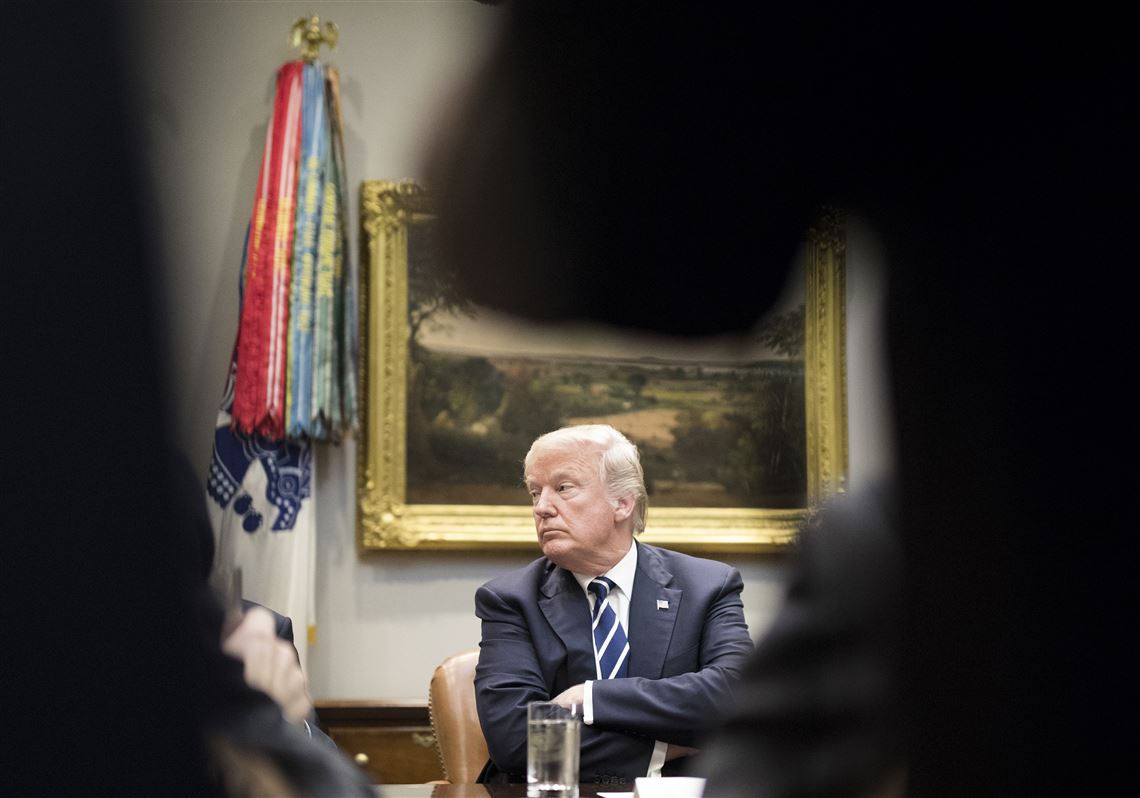WASHINGTON — In bluntly vulgar language, President Donald Trump questioned Thursday why the U.S. would accept more immigrants from Haiti and “shithole countries” in Africa rather than places like Norway, as he rejected a bipartisan immigration deal, according to people briefed on the extraordinary Oval Office conversation.
“What do we want Haitians here for?” the president asked, according to the people briefed. “Why do we want all these people from Africa here? Why do we want all these people from shithole countries?”
The president suggested that instead, the U.S. should allow more entrants from countries like Norway. Trump met this week with Norwegian Prime Minister Erna Solberg.
The comments left lawmakers taken aback, according to people familiar with their reactions.
And to Benedict Killang, executive director of the Union of African Communities in Southwestern Pennsylvania, an umbrella group for immigrants in the region with roots in Africa, it was "disheartening, when the president of the United States is walking away from the values of this country, walking away from humanity."
He had been hopeful after hearing news earlier in the week of Trump's openness to immigration reform in a meeting with congressional leaders.
"Today it is completely different," Killang said Thursday. "Sometimes I don't even want to listen to the news anymore from the White House."
Immigrants are "are working very hard day and night not only for our families but the communities we live in," he said.
Monica Ruiz, community organizer for Casa San Jose in Beechview, a resource center for Latino immigrants, also disputed this and other recent statements by Trump on immigration.
"The truth is that the visa lottery system doesn't create terrorists — the current climate in this country does, and that's evident by the recent terrorist attacks like the one in Charlottesville, Va.," Ruiz said.
"The president is also always talking about legal pathways for people to go through, and if he took the time to understand immigration law, even people such as himself with limited knowledge would understand that the pathway doesn't exist," she said.
"Can we get a definition of a shithole country when the United States is also struggling with poverty, drugs and a corrupt government?" Ruiz said. "And take responsibility for the role the United States has played in creating the circumstances in other countries before we start name-calling."
Trump made the remark in the Oval Office as two lawmakers described details to him of a bipartisan compromise among six senators that would extend protections against deportation for hundreds of thousands of young immigrants and strengthen border protections.
The senators had hoped Trump would back their accord, ending a months-long, bitter dispute over protecting “Dreamers.” But the White House later rejected their proposed agreement, plunging the issue back into uncertainty just eight days before a deadline that threatens a government shutdown.
During their conversation, Dick Durbin of Illinois, the chamber’s No. 2 Senate Democratic leader, was explaining that as part of that deal, a lottery for visas that has benefited people from Africa and other nations would be ended, the sources said, though there could be some other way for them to apply. Durbin said people would be allowed to stay in the U.S. who fled here after disasters hit their homes in places including El Salvador, Guatemala and Haiti.
Asked about the remarks in which sources say that Trump specifically questioned why the U.S. would want to admit more people from Haiti and also mentioned Africa and “shithole countries,” White House spokesman Raj Shah did not deny them.
“Certain Washington politicians choose to fight for foreign countries, but President Trump will always fight for the American people,” he said. “Like other nations that have merit-based immigration, President Trump is fighting for permanent solutions that make our country stronger by welcoming those who can contribute to our society, grow our economy and assimilate into our great nation.”
Trump’s remarks were remarkable even by the standards of a president who has been accused by his foes of racist attitudes and has routinely smashed through public decorum that his modern predecessors have generally embraced.
The sources spoke on condition of anonymity because they weren’t authorized to publicly describe the conversation.
While cruder and blunter than his past public statements, the president’s comments were still in keeping with his long-standing position that the U.S. should shift its immigration policy away from poorer, developing countries, and instead focus on carefully selecting educated immigrants, especially from Europe, who can already speak English and have professional or technical skills needed in the U.S.
The comments also were reminiscent of ones the president made last year in an Oval Office meeting with Cabinet officials and administration aides, where he complained about admitting Haitians to the country, saying that they all had AIDS, as well as Nigerians, who he said would never go back to their “huts,” according to officials who heard the statements in person or were briefed on the remarks by people who did. The White House denied last month that Trump made those remarks.
The Trump administration announced late last year that it would end a temporary residency permit program that allowed nearly 60,000 citizens from Haiti to live and work in the United States following a devastating 2010 earthquake.
Trump has spoken positively about Haitians in public. During a 2016 campaign event in Miami, he said “the Haitian people deserve better” and told the audience of Haitian-Americans he wanted to “be your greatest champion, and I will be your champion.”
The agreement that Durbin and Sen. Lindsey Graham, R-S.C., described to Trump also includes his $1.6 billion request for a first installment on his long-sought border wall, aides familiar with the agreement said. They required anonymity because the agreement is not yet public.
Trump’s request covers 74 miles of border wall as part of a 10-year, $18 billion proposal.
Democrats including Durbin had long vowed they would not fund the wall but are accepting the opening request as part of a broader plan that protects from deportation about 800,000 younger immigrants brought to the country as children and now here illegally.
The deal also includes restrictions on rules allowing immigrants to bring some relatives to the U.S.
In an afternoon of drama and confusing developments, three other GOP lawmakers — including two hardliners on immigration — were also in Trump’s office for Thursday’s meeting, a development sources said Durbin and Graham did not expect. It was unclear why the three Republicans were there, and the session did not produce the results the two senators were hoping for.
“There has not been a deal reached yet,” said White House spokeswoman Sarah Huckabee Sanders. But she added, “We haven’t quite gotten there, but we feel like we’re close.”
Underscoring the pitfalls facing the effort, other Republicans also undercut the significance of the deal the half-dozen senators hoped to sell to Trump.
“How do six people bind the other 94 in the Senate? I don’t get that,” said No. 2 Senate Republican John Cornyn of Texas.
Cornyn said the six lawmakers were hoping for a deal and “everyone would fall in line. The president made it clear to me on the phone less than an hour ago that he wasn’t going to do that.”
The six senators have been meeting for months to find a way to revive protections for young immigrants who arrived in the U.S. as children and are here illegally. Trump ended the Obama-era Deferred Action for Childhood Arrivals program last year but has given Congress until March 5 to find a way to keep it alive.
Federal agencies will run out of money and have to shut down if lawmakers don’t pass legislation extending their financing by Jan. 19. Some Democrats are threatening to withhold their votes — which Republicans will need to push that legislation through Congress — unless an immigration accord is reached.
Cornyn said the real work for a bipartisan immigration deal will be achieved by a group of four leading lawmakers — the No. 2 Republicans and Democrats in both the House and Senate. That group met for the first time this week.
The immigration effort seemed to receive a boost Tuesday when Trump met with two dozen lawmakers and agreed to seek a bipartisan way to resuscitate the program. The group agreed to also include provisions strengthening security — which for Trump means building parts of a wall along the border with Mexico — curbing immigrants’ relatives from coming here and restricting the visa lottery.
Also in Thursday’s Oval Office meeting were House Majority Leader Kevin McCarthy, R-Calif., and two conservative lawmakers who’ve taken a hard line on immigration: Sen. Tom Cotton, R-Ark., and House Judiciary Committee Chairman Bob Goodlatte, R-Va.
A Republican with knowledge of Thursday’s meeting said the White House hastily invited Cotton to join the immigration discussion.
“The American people don’t want that style of immigration reform,” Cotton told reporters about the bipartisan senators’ offer. “They certainly don’t want this pine needle of a proposal that was on the table today.”
Any immigration deal would face hurdles winning congressional approval.
Many Democrats would oppose providing substantial sums for Trump’s campaign promise to build a wall along the border with Mexico. Many Hispanic and liberal members of the party oppose steps toward curtailing immigration such as ending the visa lottery and restricting the relatives that legal immigrants could bring to the U.S.
Among Republicans, some conservatives are insisting on going further than the steps that Trump has suggested. They want to reduce legal immigration, require employers to verify workers’ citizenship and block federal grants to so-called sanctuary cities that hinder federal anti-immigrant efforts.
Post-Gazette staff writer Peter Smith, Los Angeles Times, The New York Times and The Washington Post contributed.
First Published: January 11, 2018, 10:07 p.m.














